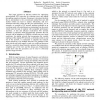Free Online Productivity Tools
i2Speak
i2Symbol
i2OCR
iTex2Img
iWeb2Print
iWeb2Shot
i2Type
iPdf2Split
iPdf2Merge
i2Bopomofo
i2Arabic
i2Style
i2Image
i2PDF
iLatex2Rtf
Sci2ools
123
click to vote
ICCAD
2000
IEEE
2000
IEEE
Fast Analysis and Optimization of Power/Ground Networks
This paper presents an efficient method for optimizing power/ground (P/G) networks by widening wires and adding decoupling capacitors (decaps). It proposes a structured skeleton that is intermediate to the conventional method that uses full meshes (which are hard to analyze efficiently), and treestructured networks (which provide poor performance). As an example, we consider a P/G network structure modeled as an overlying mesh with underlying trees originating from the mesh, which eases the task of analysis with acceptable performance sacrifices. A fast and efficient event-driven P/G network simulator is proposed, which hierarchically simulates the P/G network with an adaptation of PRIMA to handle non-zero initial conditions. An adjoint network that incorporates the variable topology of the original P/G network, as elements switch in and out of the network, is constructed to calculate the transient adjoint sensitivity over multiple intervals. The gradients of the most critical node wi...
Related Content
| Added | 31 Jul 2010 |
| Updated | 31 Jul 2010 |
| Type | Conference |
| Year | 2000 |
| Where | ICCAD |
| Authors | Haihua Su, Kaushik Gala, Sachin S. Sapatnekar |
Comments (0)

